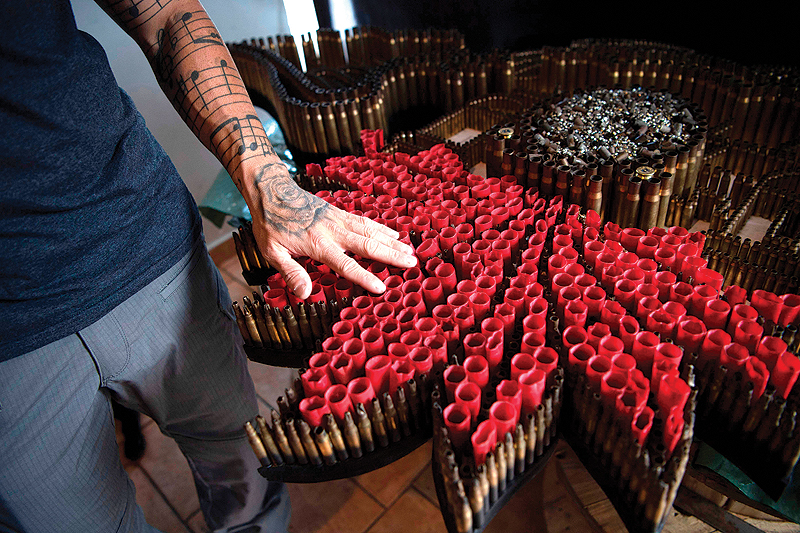"I don't know much about arms, I know art," says Rodrigo Camacho as he wields a replica AK-47 assault rifle that he made out of bullet casings in his Rio de Janeiro garage. A fervent admirer of the police, military and President Jair Bolsonaro, the heavily tattooed Brazilian artist creates pictures and sculptures out of ammunition casings discarded by police during training or by sport shooters. "My intention is to show that each one of these pieces passed through the hands of a police officer, a soldier, a sergeant, people who train to defend us," Camacho, 40, tells AFP.

In his workshop-a brightly-lit garage next to his two-story house, which he shares with his wife and black Labrador called Prince-Camacho stores thousands of used casings, fuses and projectiles in wooden boxes. With glue and the skill of a former architecture student, Camacho spends many hours transforming the bits of metal into effigies whose true form is only visible from a distance.
"Some people compare my work to trench art (pieces sculpted by soldiers with remnants of ammunition), but I just consider myself to be a Brazilian artist who believes in his country," Camacho says in a gentle voice that belies his tough image. It is a conviction literally etched on his skin, with the musical score of the national anthem tattooed around his left forearm.
His work features portraits of politicians of all stripes-including far-right Bolsonaro and a leftwing governor in the northeast-police and military symbols, replicas of AK-47s and even a chair made entirely from bullets that was inspired by the popular "Game of Thrones" television series and displayed at an international arms fair in Rio earlier this year. "I work with controversial things and people," Camacho admits.
Tribute to real heroes
Camacho began working with bullets and casings 18 months ago after visiting the Rio headquarters of BOPE, a special operations unit of the military police which is often deployed in the city's crime-ridden neighborhoods. Before then he had done carpentry and made rustic decorations on request. "A deputy commander friend in BOPE invited me to the headquarters to make a bench out of pallets," he says. "Seeing the cartridges on the ground gave me the idea of using them to make" the group's logo.
The intimidating image-a skull pierced with a dagger superimposed on two handguns-was used to commemorate the 40th anniversary of the elite unit. Camacho's newfound fame only increased when he gave Bolsonaro one of his portraits of the president. Camacho pulls out his cellphone to proudly show the video of the moment he handed Bolsonaro the piece-the president's serious face in gold and black bullet casings, framed by the outline of Brazil.
"The first time that I saw him, I looked him in the eye and sensed his conviction. God willing, he will change the country, not from one day to the next but in three years," Camacho says of Bolsonaro, a former army captain who took power in January on a promise to relax gun laws and crack down on crime. Camacho is also an unabashed admirer of Rio de Janeiro state Governor Wilson Witzel, who has applauded the deployment of snipers in the fight against drug traffickers and even suggested he would like to use missiles against criminals.
"Rio needs a strong arm," says the artist, who gifted a larger-than-life portrait to the controversial governor. Following media coverage of the Bolsonaro and Witzel portraits, Camacho has been inundated with orders, mainly from police and military units looking to decorate their bases with pieces exalting their work.
But as most of his work ends up being unpaid-in many cases in exchange for the bullet casings-Camacho is looking for sponsors, public or private. His favorite piece, made for a seminar on police deaths and injuries in Rio, shows the silhouette of an officer on crutches saluting the grave of a fallen colleague. "They are the real heroes," says Camacho.--AFP









